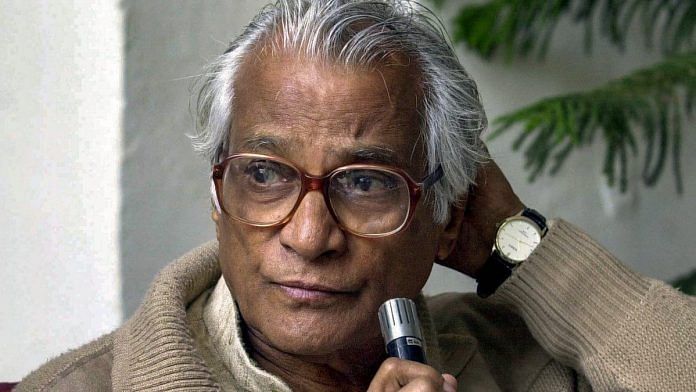George Fernandes was a trailblazer of sorts in politics, making socialism fashionable for an entire generation of Indians.
New Delhi: He set out to be a priest, but ended up as a towering socialist leader and the poster-boy of resistance against Indira Gandhi’s Emergency.
George Fernandes, who died Tuesday at 88, was forever the relentless rebel.
Once Union minister of defence, railways and industries, Fernandes had been ailing and was bedridden for many years — a sharp contrast to the firebrand leader’s active and tumultuous life.
His early journey
Fernandes was born in 1930 to a non-political family in Karnataka’s Mangalore (now Mangaluru), the eldest of six siblings. At 16, the Roman Catholic Fernandes began to study for priesthood but the rebel in him had other ideas. Disillusioned with what he viewed as the hypocrisy of the Church, he opted out at 18, and set out for Mumbai in search of employment.
It is here that Fernandes the political leader was born. Tough city life drew him to the trade union movement and the Socialist Party that was influenced by the pioneering socialist leader, Ram Manohar Lohia.
In the early 1950s, Fernandes became a prominent trade union leader in Mumbai, in particular fighting for the rights of taxi drivers. He was every bit the rebel, calling for bandhs and resorting to unorthodox methods — including fighting with hired company goons along with his workers — that led to frequent arrests.
Also read: George Fernandes wouldn’t fix his broken gate, washed his clothes & was a teetotaller
Rise in national politics
While Fernandes did fight and win civic elections, his big leap into national politics came when he contested the 1967 Lok Sabha polls from the Bombay South constituency against senior Congress leader S.K. Patil on a Samyukta Socialist Party ticket. His surprise victory over a veteran earned him the moniker, “George, the giant killer”.
As an MP, Fernandes, in his trademark khadi pyajama kurta and chappals, remained a disruptive force.
In 1974, as president of the All India Railwaymen’s Federation, he led the All India Railway strike, which almost brought the country to a standstill. Then prime minister Indira Gandhi reacted by imprisoning thousands, including Fernandes, and sacking thousands of others.
The Emergency of 1975-77 marked the defining phase of Fernandes’ political journey. He became the master of disguises — sometimes a saffron-clad sadhu, and sometimes a Sikh — to evade arrest.
His unorthodox methods to topple the Gandhi government included the use of dynamite to target government establishments, railway tracks, bridges, etc,
He was finally arrested in 1976 in Kolkata. The image of Fernandes, his handcuffed hands raised in victory, became one of iconic images of resistance to the Emergency.
After the Emergency ended, Fernandes contested the 1977 Lok Sabha polls from Muzaffarpur, Bihar, while still in prison, and won by a handsome margin.
When the Janata Party — a motley group of non-Congress parties — won the elections, Fernandes became Union Minister for Industries in Prime Minister Morarji Desai’s cabinet.
In the post, Fernandes’ most remembered and contentious decision was to throw out American multinationals IBM and Coca-Cola, and introduce the home brewed ‘77’ drink.
The next years
The Janata Party government collapsed because of its internal contradictions and the Congress returned to power in 1980. Fernandes won from Muzaffarpur again but lost in the 1984 polls, following the strong Congress wave after Indira Gandhi’s assassination.
Fernandes then joined the V.P. Singh-led Janata Dal in the late 1980s and had a short stint as Union Railways Minister from 1989-1990.
In 1994, he struck out on his own with the Samata Party, and later supported the 13-day BJP government in 1996.
Fernandes was defence minister in subsequent BJP-led coalition governments in 1998 and 1999.
This was an eventful tenure, bringing to the fore a different aspect of his personality.
The Pokhran nuclear tests (1998) and Kargil war (1999), saw the Vajpayee government adopt a muscular, nationalist approach and Fernandes — the rebel socialist at heart — led the battle.
By 2003, Fernandes merged his Samata party with Janata Dal (United) — a breakaway faction of the earlier Janata Dal.
It was then that Fernandes’ career and political journey took a nosedive.
‘Operation West End’, more famously known as the Tehelka sting operation, saw Fernandes, along with others, accused of corruption in the purchase of coffins and in the Barak missile deal.
Fernandes denied any involvement and resigned from the cabinet in 2001. An inquiry commission absolved him and Vajpayee reappointed him as defence minister — a move that led to much furore in political circles.
However, the Tehelka episode would remain a blot on his political career.
Also read: How a ‘viral’ image helped Mangalore’s George Fernandes win Bihar poll in absentia
Losing the sheen
After the NDA lost the 2004 polls, Fernandes’ political journey witnessed a sharp decline. Grave health concerns and his increasingly political isolation, saw the fiery, charismatic leader reduced to a pale shadow of himself.
In 2009, JD(U) refused him a Lok Sabha ticket from Muzaffarpur. The rebel in him was still alive so Fernandes contested on his own, but lost not just the election but his deposit as well.
His last years were spent in political wilderness, battling illness as well as a complex family dynamic.
Fernandes will be remembered as a trailblazer of sorts in politics, making socialism fashionable for an entire generation of Indians.



